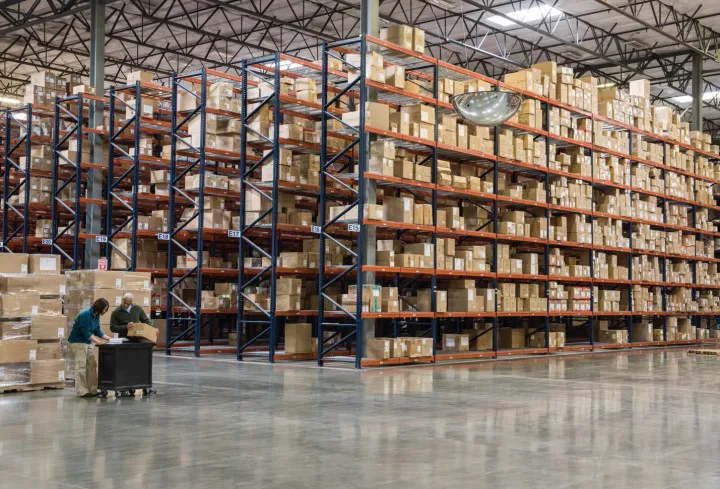Media

E-commerce Fulfillment Centers: A Growing Trend in the GCC

The GCC has solidified its position as a significant player in the global e-commerce landscape. Despite being relatively smaller than the entire Middle East and North Africa (MENA) region, the GCC has actively fostered a robust digital economy, paving the way for a notable presence in the e-commerce market.
Forecasts indicate a promising future for the GCC's e-commerce sector, with the total e-commerce revenue estimated to reach an impressive US$50 billion by 2025, a substantial rise from the US$32.85 billion recorded in 2023. This expansion is expected to maintain a Compound Annual Growth Rate (CAGR) of 10.95% between 2023 and 2027, highlighting the sector's sustained upward trajectory.
The increasing demand for online shopping has fueled a surge in the population of online buyers in the GCC, with the number of online shoppers projected to approach 60%. This upward trend emphasizes the rapid pace of digital adoption and consumer engagement in the online marketplace. The GCC's conducive environment for e-commerce development, coupled with its ever-expanding consumer base, positions the region for continued growth in the e-commerce sphere in the foreseeable future.
Statistics and Growth Trends of E-commerce in the GCC
The growth of e-commerce in the Gulf Cooperation Council (GCC) countries, notably the United Arab Emirates (UAE), has been exceptional, with a notable surge observed in 2020. The UAE witnessed a remarkable 53% increase in online sales, reaching a record-breaking $3.9 billion, which accounted for approximately 10% of total retail sales. This surge can be largely attributed to the significant shift toward online shopping prompted by the global pandemic.
Projections for the UAE's e-commerce sector are optimistic, with expectations that it will generate a substantial $8 billion in sales by 2025, leveraging the UAE's impressive rates of internet and mobile phone penetration. Additionally, the e-commerce market revenue is expected to reach $28.37 billion in 2023, with an estimated annual growth rate of 10.29% (CAGR 2023-2027), pointing toward a robust market volume of approximately $41.97 billion by 2027.
Factors Contributing to the Surge in E-commerce Activities
Several factors have contributed to the buoyant growth of the e-commerce sector in the UAE. These include the increasing popularity of social commerce and significant investments in infrastructure, such as efficient fulfillment centers. Initiatives by the Dubai Free Zones Council and strategic partnerships, such as the collaboration between Noon.com and eBay, further underscore efforts to capitalize on the expanding market landscape, setting the stage for a promising future for the e-commerce sector in the UAE and the wider GCC region.
E-commerce Fulfillment Center, Its Impact, and E-commerce Value in the region
Understanding the pivotal role of e-commerce fulfillment centers in the flourishing e-commerce landscape of the region is crucial. These centers, acting as specialized warehouse facilities, play a critical role in managing inventory storage, order processing, and seamless product shipping for online retailers. By serving as centralized hubs for storing products from various suppliers until customer orders are received, fulfillment centers ensure timely and accurate order fulfillment, contributing to a seamless shopping experience for customers.
E-commerce fulfillment service companies cater to the specific needs of both sellers and buyers, providing efficient and cost-effective solutions while enhancing the overall consumer experience. Considering that approximately 38% of online shoppers are likely to abandon a purchase if delivery expectations are not met, the role of these services in optimizing operations and meeting customer demands is pivotal for the success of online businesses.
The benefits of e-commerce fulfillment services extend to various aspects of the industry, playing a critical role in enhancing the overall value chain of e-commerce. These benefits include heightened customer satisfaction through well-established infrastructure and supply chains that ensure prompt and reliable product delivery. As 33% of customers may disengage after encountering a single negative experience and 16% of customers are willing to pay more for superior customer service, maintaining service excellence remains paramount for sellers.
Moreover, strategically located warehouses and fulfillment centers of e-commerce fulfillment service companies significantly reduce delivery times, ensuring efficient and prompt product delivery to customers, thereby augmenting the overall customer experience. These services also offer optimized inventory management solutions, enabling sellers to manage their inventory remotely and design effective inventory management systems, thereby streamlining e-commerce operations and enhancing overall efficiency.
The e-commerce market in the Middle East is experiencing significant growth, driven by shifting consumer behaviors, digital transformation initiatives, and the increased availability of diverse online payment solutions. Key market trends, including the rising prominence of mobile commerce (m-commerce) and the increasing use of social media platforms as e-commerce channels, reflect the evolving consumer preferences in the region.
However, sellers must navigate diverse regulations governing data protection, consumer rights, payment, and cross-border e-commerce to ensure compliance and success in the region's thriving e-commerce landscape.
Future Outlook
The future of e-commerce fulfillment centers in the GCC is promising, underpinned by the region's technologically adept and well-connected consumer base. With a retail penetration rate of approximately 11–12% and growing, the region presents a favorable market landscape for emerging sellers. Moreover, with a substantial percentage of users already engaging in online purchases, the region represents a significant target audience for new entrants, underscoring its readiness for advanced e-commerce transactions.
The increasing purchasing power of the population, combined with the proactive initiatives of various governments in the GCC, further solidify the region's promising and thriving e-commerce future. The robust digital infrastructure and the increasingly tech-savvy consumer base in the Middle East create a lucrative market for aspiring e-commerce businesses, promising substantial growth and success in the foreseeable future.



